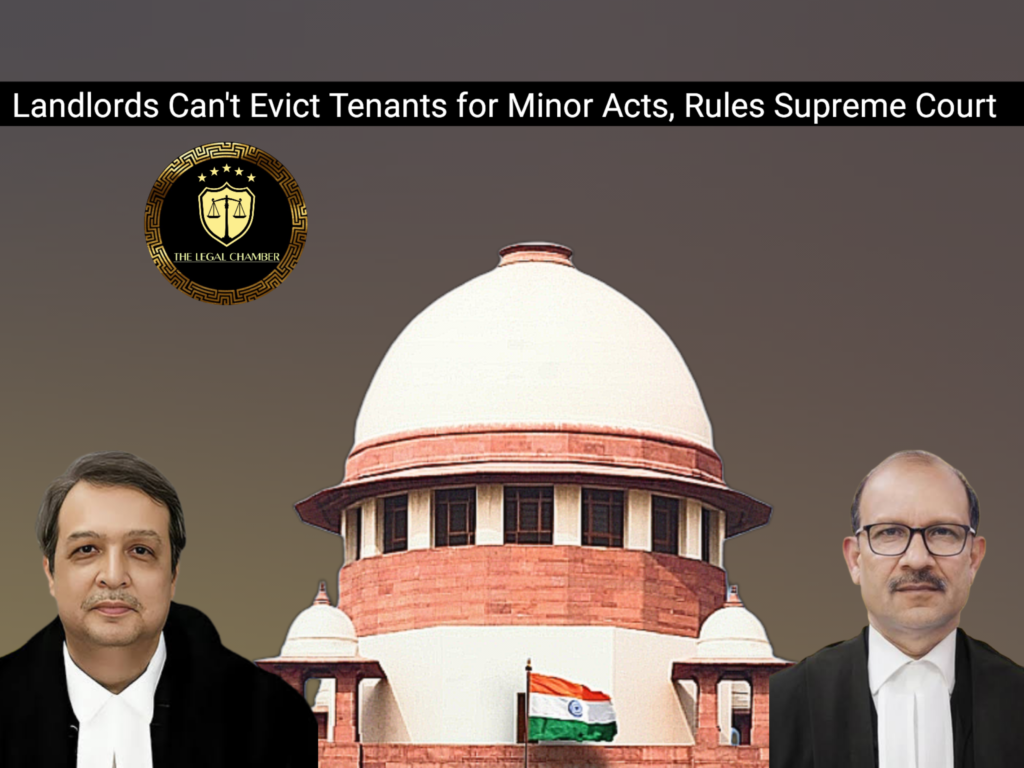
The Supreme Court ruled that eviction of a cultivating tenant under the Tamil Nadu Cultivating Tenants Protection Act, 1955, requires cogent evidence of acts destructive or injurious to the land. It emphasized the principle of beneficent construction, stating that such protective statutes must be interpreted liberally in favor of tenants, and mere pruning of trees or minor alterations do not warrant eviction under Section 3(2)(b) of the Act.
Facts Of The Case:
The case originated from a dispute over agricultural land in Coimbatore, Tamil Nadu. The appellants, represented by their legal heirs, were the cultivating tenants, while the respondents were the landlords. The tenants had previously successfully sued the landlords (O.S. No. 1363/1993) to protect their possession. Subsequently, the landlords filed a separate suit (O.S. No. 491/1994) for a permanent injunction, alleging the tenants had damaged the land by cutting trees and digging pits. This suit was initially decreed in the landlords’ favor by the Trial Court but was later overturned by the First Appellate Court. The landlords then pursued eviction before the Revenue Court under the Tamil Nadu Cultivating Tenants Protection Act, 1955, relying on the Commissioner’s report from the civil suit. The Revenue Court ordered eviction, a decision which the High Court upheld in a Second Appeal and a connected Civil Revision Petition. The core factual dispute was whether the tenants’ actions constituted “destructive or injurious” acts under Section 3(2)(b) of the Act, justifying eviction. The Supreme Court’s appeal challenged this finding, leading to the final judgment.
Procedural History:
The procedural history of this case is complex, involving parallel civil and revenue proceedings. The landlords first filed Original Suit No. 491/1994, which the Trial Court decreed in their favor, but the First Appellate Court set aside this decree. Concurrently, the landlords initiated eviction proceedings (O.P. No. 16/2001) before the Revenue Court under the Tamil Nadu Cultivating Tenants Protection Act, 1955. The Revenue Court, relying on a Commissioner’s report from the civil suit, ordered the tenants’ eviction. The tenants challenged this in the High Court via a Civil Revision Petition. The High Court, hearing the landlords’ Second Appeal against the civil suit judgment and the revision petition together, allowed the appeal, set aside the First Appellate Court’s judgment, and affirmed the Revenue Court’s eviction order. The Supreme Court, in the present appeal, ultimately set aside the High Court’s judgment and the Revenue Court’s eviction order.
READ ALSO:Supreme Court Quashes Cheating Case: Fake Fire NOC Not Needed for School Building
Court Observation:
The Supreme Court made several critical observations in its judgment. It found no cogent evidence to prove the tenants had committed acts destructive or injurious to the land under Section 3(2)(b) of the Tamil Nadu Cultivating Tenants Protection Act, 1955. The Court held that the Revenue Court had mechanically relied on the Commissioner’s report and the High Court had affirmed this in a “slipshod manner” during its revisional jurisdiction. Crucially, the Court emphasized the principle of “beneficent construction,” ruling that protective statutes like the 1955 Act must be interpreted liberally in favor of tenants to fulfill their legislative intent of preventing unjust evictions. It stated that minor acts like pruning trees do not constitute grounds for eviction, and such a drastic measure is only justified upon clear and reliable evidence of gross violation.
Final Decision & Judgement:
The Supreme Court allowed the appeals and set aside the impugned judgment of the High Court. Consequently, the eviction order passed by the Revenue Court was also quashed. The Court restored the position that existed after the First Appellate Court’s decision, which was in favor of the tenants. The final ruling protects the appellants’ possession, and the Court expressly directed that the respondents shall not interfere with the appellants’ possession of the suit land, save and except in accordance with law.
Case Details:
Case Title: Govindappa Gounder @ Govindasamy (Dead) Versus K. Vijayakumar and Ors. Citation: Civil Appeal Nos. 7464-7466 of 2011 Criminal/Civil Appeal No.: Civil Appeal Date of Judgement: September 10, 2025 Judges/Justice Name: Justice J.B. Pardiwala and Justice J. Sandeep Mehta
Download The Judgement Here